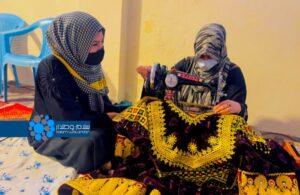KABUL (SW) – Salam Watandar’s findings from interviews with 16 women and girls suffering from mental disorders show that 12 of them have suffered from various mental disorders as a result of the changes that have occurred in their lives.
The age groups of 12 women and girls who have been facing mental disorders since the age of two are between 16 and 25 years old. Among the 16 particiants in this report, 12 are dealing with depression and four others with more serious mental disorders.
20-year-old Fawzia, a student of law and political science, who was left with a dark future due to the closure of universities for girls, and 24-year-old Aziza, a student of journalism, say that the imposition of restrictions on women and girls has made her and other girls’ lives meaningless.
Fawzia says: “I realized that the same talent, self-confidence, courage and motivation that I had before are not present and every day our talent is killed in us. In the past few months, the problems are increasing and there is still no hope for the future. The meaning of life is gone. I have visited a psychologist, he said that you are suffering from depression and you need to be treated. When these problems become more for me, I try to suppress them by crying and sleeping.”
Azizah also says: “All the girls are suffering from mental problems due to being deprived of work and education, and I am also facing the same problems and I am talking to myself. Because I have studied and worked hard in a prestigious government university. But now I am not provided with a field to work and I am facing problems and I am depressed.”
Among these girls and women, four of them try to commit suicide due to mental disorders, but they were saved. Among them, three people are experiencing this situation since the last two years and another person is facing this health challenge since four years.
Shaqhaiq, Maryam and Hasna Babak, who were engaged in work, studies and social activities before the recent developments, say that the changes in their lifestyle have faced them with great challenges and they try to commit suicide to avoid this situation.
Shaqhaiq says: “Before the Islamic Emirate came, I used to go out and do my duty. I went to courses, school and everywhere; But now that I’m home, I’m not allowed to work outside and I was thinking that I should die from this life and I committed suicide.”
Maryam also says: “I had studied and I had a diploma and I wanted to work. But, I could not work. Then I got engaged and my fiancee was not the right person for me, so afterwards problems arose, I wanted to divorce my fiancee, and the court doesn’t decide in absentia. My trial has left me undecided and this has made me more depressed. I have thought about suicide many times.”
Hasna Babak said: “It’s been almost a year since this disease became acute due to various problems. First, staying away from education for a year when we were not allowed to go to universities and schools. My mental worries have become too much and this disease sometimes causes me to try commit suicide and self-harm.”
On the other hand, four other women who were interviewed in this report say that they have faced psychological challenges due to economic problems and family problems.
Shabana, one of these women, says: “I have been suffering from mental and emotional problems since 2018. The reason I have this disease is because I was once electrocuted. After spending a day and night in a coma, after that I started to forget, and strange symptoms were found in my body. I would set myself on fire, set the curtain on fire, and break the dishes.”
Zainab, another one of these women, said: “I have been suffering from mental and emotional problems for four years, and when I realized that the cause of my illness could be family problems and the problems that happened to me, and I mostly thought about lonely places. I do it and there is no one and the house is dark and when this problem increases, I don’t like to be in the community.”
Many residents of Kabul consider the lives of men and women to be interdependent and say that the psychological pressure on women affects the men of the family as well.
Javed, a resident of Kabul, says: “From where we walk in the city and the market, we see that mental and emotional problems have increased and abnormal people have increased. In my opinion, this mental illness is more common among women, and I think the reason for this is the work and education restrictions on women that have been imposed over the past few years.”
Mohammad, another resident of Kabul, also says: “As far as I am aware in the community and family, I see that mental problems have increased. These problems affect both men and women. But most women suffer and the reason is the imposition of restrictions. It is natural that when a person faces this problem, his behavior changes. I myself have noticed my sister’s behavior many times.”
Women’s rights activists, also confirming the increase in mental disorders among women and girls, say that the imposition of restrictions on women has caused an increase in forced and underage marriages, women’s lack of mobility and lack of personal and financial independence among women, and all this can cause disorders.
Frouzan Davoudzai, a women’s rights activist, says: “Previously, women were provided with work and women were educated, and these women who hoped to to study, but they got disappointed. This itself causes mental problems.”
Psychologists also confirm the increase of mental disorders among women and girls in the past two years and say that most of their clients are women with mental disorders.
Haibatullah Ebrahim, a psychologist, says: “Most of our clients are female because men don’t feel like visiting a psychologist anymore. Because women are more vulnerable. There are various reasons why girls face mental and emotional problems. The first reason can be the closing of schools and universities in the current situation and after the change of the system. Also, from a psychological point of view, girls are more emotional and vulnerable.”
Anoushe Mohammadi, another psychologist, says: “Since the Emirate period came, they took away the right to study from women, they took away the right to work. This has increased the psychological problems in our society. Most of the mental health clients are female. Mental illness among women is high for this reason because they are the most vulnerable section of the society and the right to study and work has been taken away from women. That is why it is more common among women.”
On the other hand, mental and neurological doctors believe that women are more vulnerable to mental disorders than men and say that in all societies, women need more attention and compassion.
Abdul Mobin Hakimi, a professor of mental and nervous diseases, says: “These diseases are more common among the women, and it is common all over the world that more women are affected. In terms of biological structure, the brains of men and women are not different. There is a believe that a woman’s brain weighs less, but this has not been fully proven and women are a delicate and vulnerable species compared to men. That’s why women have more psychological disorders.”
However, Irfanullah Sharafzoi, the spokesman and head of the media department at the Afghan Red Crescent Society, says that currently 1,648 female mental patients are being treated in the psychiatric centers of this organization.
Irfanullah Sharafzoi added: “Through the Afghan Red Crescent, there are treatment centers for mental patients in Kabul, Nangarhar, Herat, Balkh and Kunduz, and in these centers, 1,648 female mental patients are under treatment, of which 258 are in the centers and the rest of the patients are in their homes and visit our centers once a week.”
It should be mentioned that Salam Watandar also recently released a report whose findings show a dramatic increase in murder and suicide among women in Afghanistan.
ENDS






